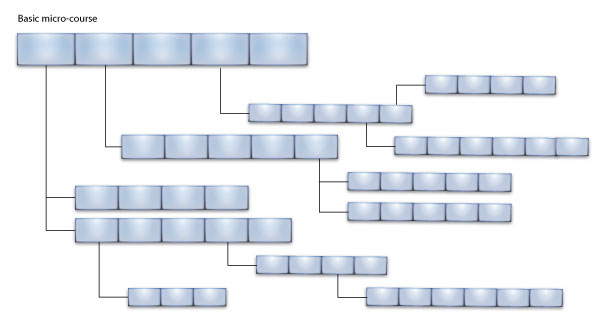Coursmos. The first micro-course learning platform
Resident of the 2nd cycle of the Happy Farm startup incubator , who would like to say special thanks, thanks to the acceleration program and the involvement of many mentors from Silicon Valley, it was possible to develop a new learning concept for Twitter generation - micro-courses from scratch in just a month.
The rapidly growing field of online learning faces a number of problems, one of which is the following - students do not complete online courses until the end. According to data from various sources, the failure rate reaches 94%.
Why do people lose motivation and quit? Our answer is too long.
Long online courses provide a significant amount of knowledge. Yes, it is, but now only the author decides how many of them need to be accommodated in the course.

Is it possible to implement a more flexible approach when a user learns only what is interesting to him, while freely navigating in the information space? Reminds the Internet, right?
We are not just talking about a service that does the same, but better. We are talking about a new format of micro-courses, which provides previously inaccessible opportunities for both students and authors.
Students.
1. Quick training.
A micro-course is an independent unit of knowledge that can be mastered in less than an hour. Or take micro-lessons, spending only a few minutes on it. A person does not have time to lose interest and concentration. Within a short period of time, the effectiveness of training is maximum. At the same time, a person knows in advance that he will spend only a few minutes, so he allows himself to disconnect from other matters and concentrate on learning. At the same time, having completed the course, he is satisfied with the achieved result. The pleasure of completion comes much faster and motivates you to further study, unlike regular online courses, when you drop several courses, a person may lose confidence in online learning in general.
2. Surfing.
Each lesson of each course has a link to a micro-course, which is a detailed version of this lesson. A more detailed course can also be detailed. Thus, a person can study each topic as deeply as it is interesting and necessary at the moment. In parallel with the extensions of the author, micro-courses of other authors on the same topic may be present. It depends on the author’s account settings.
3. Micro-courses on request.
Interest-driven learning and request-driven teaching. If a person, viewing a lesson, does not find a more detailed version, he can in one click send a request to the author to create a more detailed micro-course and receive it within a few days. It's like clicking like. When the author issues the requested micro-course, the requestor receives a notification and a link to it.
4. The combination of free and low-cost content.
Each micro-course is either free or costs much less than usual. Thus, the user gets the opportunity to pay only for the knowledge that he needs now. On the other hand, if the micro-course does not fit the person, but understands it much faster and will have less regret about the time spent.
Teachers.
1. Fast and free creation of educational content.
The micro-course can be created literally on the go or directly during work. Enough to have a phone. Lessons are recorded on camera, related materials, tests are added. After downloading, micro-courses are available both from a mobile application and from the web. Moreover, the cost of creating such a course is close to zero. It's like Instagram for creating courses, which allows you to create dozens of micro-courses.
2. A curriculum based on user preferences.
Notifications “I want more” from students are visible to the author, who, based on these data, decides which micro-course to create next. The author spends his time creating the course, knowing how many consumers he already has and being able to guess how many will increase over a certain period of time.

3. The ability to grow your knowledge tree.
By attaching one micro-course to another, the author grows his knowledge tree, which, unlike ordinary courses, is a reflection of his experience as a whole, and grows organically, together with the author.
4. Fresh information.
The author can update the course at least every day, in accordance with the latest trends and taking into account feedback from students. Micro-courses are living objects, due to the exceptional ease of creation and editing, they can constantly improve and adapt to the expectations of users.
5. Flexible monetization system.
The ability to create dozens of micro-courses gives room for sales models:
- free basic courses, paid extensions;
- courses with free first lessons, a full course paid;
- free courses with paid additional materials;
- discount courses, etc.
6. Corporate knowledge.
Organizations, within themselves, can grow their own knowledge trees, any employee can become a participant in the creation of which. It is no secret that a lot of knowledge in organizations is transferred from one employee to another. Micro-courses allow you to collect, structure and save this information, thus being an additional highly effective tool for internal learning.
The format of micro-courses can incredibly simplify the transfer of knowledge from person to person. We are confident that, just as Twitter has opened up a new concept of communication, Coursmos will open a new page in online learning.
Do you know something useful? Try to make your micro-course, it's simple. iOS app here: https://itunes.apple.com/us/app/coursmos/id692934231?mt=8
Always happy to receive feedback. Thanks.
Coursmos.com
What are micro courses?
The rapidly growing field of online learning faces a number of problems, one of which is the following - students do not complete online courses until the end. According to data from various sources, the failure rate reaches 94%.
Why do people lose motivation and quit? Our answer is too long.
Long online courses provide a significant amount of knowledge. Yes, it is, but now only the author decides how many of them need to be accommodated in the course.

Micro-course. Normal online course. Is it possible to implement a more flexible approach when a user learns only what is interesting to him, while freely navigating in the information space? Reminds the Internet, right?
We are not just talking about a service that does the same, but better. We are talking about a new format of micro-courses, which provides previously inaccessible opportunities for both students and authors.
Students.
1. Quick training.
A micro-course is an independent unit of knowledge that can be mastered in less than an hour. Or take micro-lessons, spending only a few minutes on it. A person does not have time to lose interest and concentration. Within a short period of time, the effectiveness of training is maximum. At the same time, a person knows in advance that he will spend only a few minutes, so he allows himself to disconnect from other matters and concentrate on learning. At the same time, having completed the course, he is satisfied with the achieved result. The pleasure of completion comes much faster and motivates you to further study, unlike regular online courses, when you drop several courses, a person may lose confidence in online learning in general.
2. Surfing.
Each lesson of each course has a link to a micro-course, which is a detailed version of this lesson. A more detailed course can also be detailed. Thus, a person can study each topic as deeply as it is interesting and necessary at the moment. In parallel with the extensions of the author, micro-courses of other authors on the same topic may be present. It depends on the author’s account settings.
3. Micro-courses on request.
Interest-driven learning and request-driven teaching. If a person, viewing a lesson, does not find a more detailed version, he can in one click send a request to the author to create a more detailed micro-course and receive it within a few days. It's like clicking like. When the author issues the requested micro-course, the requestor receives a notification and a link to it.
4. The combination of free and low-cost content.
Each micro-course is either free or costs much less than usual. Thus, the user gets the opportunity to pay only for the knowledge that he needs now. On the other hand, if the micro-course does not fit the person, but understands it much faster and will have less regret about the time spent.
Teachers.
1. Fast and free creation of educational content.
The micro-course can be created literally on the go or directly during work. Enough to have a phone. Lessons are recorded on camera, related materials, tests are added. After downloading, micro-courses are available both from a mobile application and from the web. Moreover, the cost of creating such a course is close to zero. It's like Instagram for creating courses, which allows you to create dozens of micro-courses.
2. A curriculum based on user preferences.
Notifications “I want more” from students are visible to the author, who, based on these data, decides which micro-course to create next. The author spends his time creating the course, knowing how many consumers he already has and being able to guess how many will increase over a certain period of time.

3. The ability to grow your knowledge tree.
By attaching one micro-course to another, the author grows his knowledge tree, which, unlike ordinary courses, is a reflection of his experience as a whole, and grows organically, together with the author.
4. Fresh information.
The author can update the course at least every day, in accordance with the latest trends and taking into account feedback from students. Micro-courses are living objects, due to the exceptional ease of creation and editing, they can constantly improve and adapt to the expectations of users.
5. Flexible monetization system.
The ability to create dozens of micro-courses gives room for sales models:
- free basic courses, paid extensions;
- courses with free first lessons, a full course paid;
- free courses with paid additional materials;
- discount courses, etc.
6. Corporate knowledge.
Organizations, within themselves, can grow their own knowledge trees, any employee can become a participant in the creation of which. It is no secret that a lot of knowledge in organizations is transferred from one employee to another. Micro-courses allow you to collect, structure and save this information, thus being an additional highly effective tool for internal learning.
The format of micro-courses can incredibly simplify the transfer of knowledge from person to person. We are confident that, just as Twitter has opened up a new concept of communication, Coursmos will open a new page in online learning.
Do you know something useful? Try to make your micro-course, it's simple. iOS app here: https://itunes.apple.com/us/app/coursmos/id692934231?mt=8
Always happy to receive feedback. Thanks.
Coursmos.com
